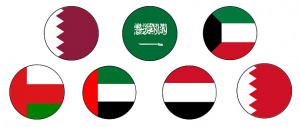Language/Gulf-arabic/Vocabulary/Animals
Hi Gulf Arabic learners! 😊
In this lesson, we will explore the vocabulary related to animals in Gulf Arabic. You will also learn some interesting cultural information and facts about animals in the Gulf region. Let's get started!
After mastering this lesson, these related pages might interest you: Say Hello and Greetings in Gulf Arabic, Fruits & Colors.
Domestic Animals[edit | edit source]
Let's start with the vocabulary related to domestic animals. These animals are commonly found in households or on farms in the Gulf region.
Cat[edit | edit source]
Cats are a popular pet in the Gulf region. They are called "قط" (qat) in Gulf Arabic. Here is a dialogue for you:
- Person 1: هذا قطي. (Hatha qati) - This is my cat.
- Person 2: جميل جداً. (Jameel jiddan) - It's very beautiful.
| Gulf Arabic | Pronunciation | English |
|---|---|---|
| قط | qat | Cat |
Dog[edit | edit source]
Dogs are also popular pets in the Gulf region. They are called "كلب" (kalb) in Gulf Arabic. Here is a dialogue for you:
- Person 1: هذا كلبي. (Hatha kalbi) - This is my dog.
- Person 2: كلبك لطيف جداً. (Kalbuk latif jiddan) - Your dog is very cute.
| Gulf Arabic | Pronunciation | English |
|---|---|---|
| كلب | kalb | Dog |
Sheep[edit | edit source]
Sheep are commonly raised on farms in the Gulf region. They are called "خروف" (kharoof) in Gulf Arabic. Here is a dialogue for you:
- Person 1: لدينا خراف في المزرعة. (Ladina kharoof fil mazra'a) - We have sheep on the farm.
- Person 2: هل تحب أكل لحم الخروف؟ (Hal tuhibb akal lahme al kharoof?) - Do you like eating lamb?
| Gulf Arabic | Pronunciation | English |
|---|---|---|
| خروف | kharoof | Sheep |
Wild Animals[edit | edit source]
Now, let's explore the vocabulary related to wild animals in the Gulf region. These animals are not commonly found in households or on farms.
Oryx[edit | edit source]
The Oryx is a type of antelope that is native to the Arabian Peninsula. It is also the national animal of Qatar. In Gulf Arabic, it is called "الغزال العربي" (Al ghazal al arabiy). Here is a dialogue for you:
- Person 1: رأيت الغزال العربي في الصحراء. (Ra'aytu al ghazal al arabiy fil sahara) - I saw the Arabian Oryx in the desert.
- Person 2: إنه حيوان رائع. (Innahu hayawan ra'ee) - It's a magnificent animal.
| Gulf Arabic | Pronunciation | English |
|---|---|---|
| الغزال العربي | al ghazal al arabiy | Arabian Oryx |
Camel[edit | edit source]
Camels are widely known as the "ships of the desert" due to their ability to survive in harsh desert conditions. They are also a symbol of Arabian culture. In Gulf Arabic, they are called "جمل" (jamal). Here is a dialogue for you:
- Person 1: لدينا جمال في الصحراء. (Ladina jamaal fil sahara) - We have camels in the desert.
- Person 2: الجمل حيوان قوي جداً. (Al jamal hayawan qawi jiddan) - Camels are very strong animals.
| Gulf Arabic | Pronunciation | English |
|---|---|---|
| جمل | jamal | Camel |
Falcon[edit | edit source]
Falconry is a popular sport in the Gulf region, and the falcon is a highly valued bird in Gulf culture. In Gulf Arabic, they are called "صقر" (saqr). Here is a dialogue for you:
- Person 1: لدي صقر. (Lada saqr) - I have a falcon.
- Person 2: إنه حيوان رائع و قوي. (Innahu hayawan ra'ee wa qawi) - It's a magnificent and strong bird.
| Gulf Arabic | Pronunciation | English |
|---|---|---|
| صقر | saqr | Falcon |
Interesting Facts[edit | edit source]
- Did you know that the dromedary camel has played a vital role in Gulf culture for thousands of years? It was used as a mode of transportation, and its meat and milk were important sources of nutrition. - The Arabian Oryx was declared extinct in the wild in 1972, but thanks to conservation efforts, it is now classified as vulnerable and lives in protected areas in the Gulf region. - Falconry was historically used for hunting and was a source of meat for Bedouin tribes in the Gulf region. Today, it is mainly a sport for the wealthy.
To improve your Gulf Arabic Vocabulary, you can also use the Polyglot Club website. Find native speakers and ask them any questions!
➡ If you have any questions, please ask them in the comments section below.
➡ Feel free to edit this wiki page if you think it can be improved. 😎
Other Lessons[edit | edit source]
- Clothes
- Colors
- Feelings and Emotions
- Days of the Week
- Geography
- How to say Good Bye?
- Count to 10
- At the Market
- How to Say Hello and Greetings

